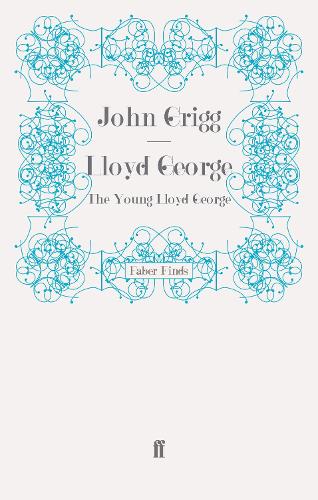
Lloyd George: The Young Lloyd George
(Paperback, Main)
Available Formats
Paperback, Main
Published: 20th January 2011
Paperback, Main
Published: 9th December 2010
Paperback, Main
Published: 17th February 2011
Paperback, Main
Published: 21st April 2011
Publishing Details
Lloyd George: The Young Lloyd George
By (Author) John Grigg
Faber & Faber
Faber & Faber
9th December 2010
Main
United Kingdom
Classifications
General
Non Fiction
European history
Political leaders and leadership
941.083092
Physical Properties
Paperback
336
Width 126mm, Height 198mm, Spine 25mm
364g
Description
John Grigg's four volume life of Lloyd George is one of the great political biographies. Volume 1, The Young Lloyd George, covers the years from his birth in 1863 to the end of the Boer War in 1902. John Grigg describes the future Prime Minister's emergence as a local solicitor and politician and his first twelve years in the House of Commons. In the process he challenges many stock assumptions about Lloyd George while never losing sight of the man behind the politician, nor forgetting that politics were the dominating passion of his life. complete his magnum opus but what exists is a masterpiece. Faber Finds is reissuing the four volumes: The Young Lloyd George, Lloyd George: The People's Champion 1902-1911, Lloyd George: From Peace to War 1912-1916, Lloyd George: War Leader 1916-1918. that anyone could write a new volume of Lloyd George's biography which would make everything previously written look narrow-sighted and stale. By the quality of his perception and writing he has given a new sharpness and interpretation.' Roy Jenkins, Observer of our times, whose books on Lloyd George will be read as long as civilization lasts.' Brian Walden, Evening Standard Grigg has dug up a whole mass of information. A mixture of shrewd human judgement and unblinkered insight.' C. P. Snow, Financial Times.
Author Bio
John Grigg (1924-2001) was a journalist and historian. The author of a number of books his major achievement was the tragically unfinished biography of Lloyd George. Faber Finds is reissuing the four completed volumes as well as his revisionist 1943: The Victory that Never Was. Taking advantage of the Peerage Act of 1963, he renounced his hereditary peerage having succeeded his father as Baron Altrincham in 1955.
